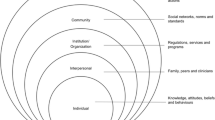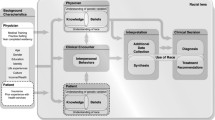Abstract
Clinical genomic testing, analysis of your entire genetic material for healthcare purposes, is a complex topic for various medical specialities. Although Australia is a multicultural society, most genomic resources are produced in English which can make understanding challenging for people from culturally and linguistically diverse (CALD) backgrounds. A mixed methods approach explored the views of healthcare interpreters and people from CALD backgrounds to identify knowledge gaps and inform the provision of more equitable services. Eighteen healthcare interpreters completed a survey from two public hospitals in Melbourne. Descriptive data analysis informed the four pilot interviews with individuals from CALD backgrounds identified through online advertisements. Interpreters revealed variable satisfaction with patient understanding of genomic concepts and suggested that basic training and resources on genomics would help facilitate interpretation. Three themes arose from the pilot interviews: (1) cultural factors; (2) perceptions of genomics; and (3) language barriers and complex terminology. Resources that consider cultural differences and language barriers will help to ensure people from CALD backgrounds are adequately informed about genomic testing. The pilot interviews will inform future in-depth studies of the views of people from the CALD community.

Similar content being viewed by others
Data availability
The datasets generated during and/or analysed during the current study are available from the corresponding author on reasonable request.
Code availability
Not applicable.
References
Allford A, Qureshi N, Barwell J, Lewis C, Kai J (2014) What hinders minority ethnic access to cancer genetics services and what may help? Eur J Hum Genet 22(7):866–874. https://doi.org/10.1038/ejhg.2013.257
Armstrong K, Micco E, Carney A, Stopfer J, Putt M (2005) Racial differences in the use of BRCA1/2 testing among women with a family history of breast or ovarian cancer. JAMA 293(14):1729–1736. https://doi.org/10.1001/jama.293.14.1729
Australian Bureau of Statistics (2017) Census of population and housing: reflecting Australia - stories from the census 2016 (No. 2071.0). Retrieved from https://www.abs.gov.au/AUSSTATS/abs@.nsf/Lookup/2071.0Main+Features100012016?OpenDocument
Australian Health Ministers’ Advisory Council. (2017). National Health Genomics Policy Framework 2018–2021. Retrieved from http://www.coaghealthcouncil.gov.au/Publications/Reports
Baty BJ, Kinney AY, Ellis SM (2003) Developing culturally sensitive cancer genetics communication aids for African Americans. Am J Med Genet A 118a(2):146–155. https://doi.org/10.1002/ajmg.a.10150
Braun V, Clarke V (2006) Using thematic analysis in psychology. Qual Res Psychol 3(2):77–101. https://doi.org/10.1191/1478088706qp063oa
Catz DS, Green NS, Tobin JN, Lloyd-Puryear MA, Kyler P, Umemoto A, Wolman F (2005) Attitudes about genetics in underserved, culturally diverse populations. Community Genet 8(3):161–172. https://doi.org/10.1159/000086759
Comino EJ, Silove D, Manicavasagar V, Harris E, Harris MF (2001) Agreement in symptoms of anxiety and depression between patients and GPs: the influence of ethnicity. Fam Pract 18(1):71–77. https://doi.org/10.1093/fampra/18.1.71
Condit CM (2010) Public understandings of genetics and health. Clin Genet 77(1):1–9. https://doi.org/10.1111/j.1399-0004.2009.01316.x
Cruz-Correa M, Perez-Mayoral J, Dutil J, Echenique M, Mosquera R, Rivera-Roman K, Pardo S (2017) Clinical cancer genetics disparities among Latinos. J Genet Couns 26(3):379–386. https://doi.org/10.1007/s10897-016-0051-x
Cyril S, Green J, Nicholson JM, Agho K, Renzaho AM (2016) Exploring service providers’ perspectives in improving childhood obesity prevention among CALD communities in Victoria Australia. Plos One 11(10):e0162184. https://doi.org/10.1371/journal.pone.0162184
Dougherty MJ, Lontok KS, Donigan K, McInerney JD (2014) The critical challenge of educating the public about genetics. Curr Genet Med Rep 2(2):48–55. https://doi.org/10.1007/s40142-014-0037-7
Flores G (2005) The impact of medical interpreter services on the quality of health care: a systematic review. Med Care Res Rev 62(3):255–299. https://doi.org/10.1177/1077558705275416
George S, Duran N, Norris K (2014) A systematic review of barriers and facilitators to minority research participation among African Americans, Latinos, Asian Americans, and Pacific Islanders. Am J Public Health 104(2):e16-31. https://doi.org/10.2105/ajph.2013.301706
Gorman D, Brough M, Elvia R (2003) How young people from culturally and linguistically diverse backgrounds experience mental health: some insights for mental health nurses. Int J Ment Health Nurs 12(3):194–202
Graves JM, Moore M, Gonzalez C, Ramos J, Nguyen L, Vavilala MS (2020) Too little information: accessibility of information about language services on hospital websites. J Immigr Minor Health 22(3):433–438. https://doi.org/10.1007/s10903-020-00978-8
Greenstock L, Woodward-Kron R, Fraser C, Bingham A, Naccarella L, Elliott K, Morris M (2012) Telecommunications as a means to access health information: an exploratory study of migrants in Australia. J Public Health Res 1(3):216–221. https://doi.org/10.4081/jphr.2012.e34
Gregg J, Saha S (2007) Communicative competence: a framework for understanding language barriers in health care. J Gen Intern Med 22(Suppl 2):368–370. Retrieved from https://ezp.lib.unimelb.edu.au/login?url=https://search.ebscohost.com/login.aspx?direct=true&db=mnh&AN=17957428&site=eds-live&scope=site
Gutierrez AM, Robinson JO, Statham EE, Scollon S, Bergstrom KL, Slashinski MJ, Street RL (2017) Portero versus portador: Spanish interpretation of genomic terminology during whole exome sequencing results disclosure. Per Med 14(6):503–514. https://doi.org/10.2217/pme-2017-0040
Gutierrez AM, Statham EE, Robinson JO, Slashinski MJ, Scollon S, Bergstrom KL, McGuire AL (2019) Agents of empathy: How medical interpreters bridge sociocultural gaps in genomic sequencing disclosures with Spanish-speaking families. Patient Educ Couns 102(5):895–901. https://doi.org/10.1016/j.pec.2018.12.012
Haga SB, Barry WT, Mills R, Ginsburg GS, Svetkey L, Sullivan J, Willard HF (2013) Public knowledge of and attitudes toward genetics and genetic testing. Genet Test Mol Biomarkers 17(4):327–335. https://doi.org/10.1089/gtmb.2012.0350
Harris PA, Taylor R, Thielke R, Payne J, Gonzalez N, Conde JG (2009) Research electronic data capture (REDCap)–a metadata-driven methodology and workflow process for providing translational research informatics support. J Biomed Inform 42(2):377–381. https://doi.org/10.1016/j.jbi.2008.08.010
Harris P, Taylor R, Minor B, Elliott V, Fernandez M, O’Neal L, Duda S (2019) The REDCap consortium: building an international community of software platform partners. J Biomed Inform 95:103208. https://doi.org/10.1016/j.jbi.2019.103208
Henderson S, Kendall E, See L (2011) The effectiveness of culturally appropriate interventions to manage or prevent chronic disease in culturally and linguistically diverse communities: a systematic literature review. Health Soc Care Community 19(3):225–249. https://doi.org/10.1111/j.1365-2524.2010.00972.x
Hudson M, Beaton A, Milne M, Port W, Russell K, Smith B, Toki V, Uerata L, Wilcox P (2016) Te Mata Ira: guidelines for genomic research with Māori. Retrieved from http://researcharchive.wintec.ac.nz/5640/
Komaric N, Bedford S, van Driel ML (2012) Two sides of the coin: patient and provider perceptions of health care delivery to patients from culturally and linguistically diverse backgrounds. BMC Health Serv Res 18(12):322. https://doi.org/10.1186/1472-6963-12-322
Krieger M, Reiser CA, Petty EM, Agather A, Douglass K (2018) Working with the Hmong population in a genetics setting: an interpreter perspective. J Genet Couns 27(3):565–573. https://doi.org/10.1007/s10897-017-0153-0
Lara-Otero K, Weil J, Guerra C, Cheng JKY, Youngblom J, Joseph G (2018) Genetic counselor and healthcare interpreter perspectives on the role of interpreters in cancer genetic counseling. Health Commun 1–11.https://doi.org/10.1080/10410236.2018.1514684
Lea DH, Kaphingst KA, Bowen D, Lipkus I, Hadley DW (2011) Communicating genetic and genomic information: health literacy and numeracy considerations. Public Health Genomics 14(4–5):279–289. https://doi.org/10.1159/000294191
Levy DE, Byfield SD, Comstock CB, Garber JE, Syngal S, Crown WH, Shields AE (2011) Underutilization of BRCA1/2 testing to guide breast cancer treatment: black and Hispanic women particularly at risk. Genet Med 13(4):349–355. https://doi.org/10.1097/GIM.0b013e3182091ba4
Lewit-Mendes M, Pereira K, Dunlop K, Boughtwood T (2018) Australian genomics: genomics in the community project landscape analysis report. Retrieved from https://www.australiangenomics.org.au/resources/for-patients/genomics-in-the-community/
QSR International Pty Ltd. (2018) NVivo (Version 12). https://www.qsrinternational.com/nvivo-qualitative-data-analysis-software/home
Molster C, Charles T, Samanek A, O’Leary P (2009) Australian study on public knowledge of human genetics and health. Public Health Genomics 12(2):84–91. https://doi.org/10.1159/000164684
Phillips C (2010) Using interpreters a guide for GPs. Aust Fam Phys 39:188–195. Retrieved from http://www.racgp.org.au/afp/2010/april/using-interpreters-–-a-guide-for-gps/
Rao DV, Warburton J, Bartlett H (2006) Health and social needs of older Australians from culturally and linguistically diverse backgrounds: issues and implications. Australas J Ageing 25(4):174–179. https://doi.org/10.1111/j.1741-6612.2006.00181.x
Roth SC (2019) What is genomic medicine? J Med Libr Assoc 107(3):442–448. https://doi.org/10.5195/jmla.2019.604
Saleh M, Barlow-Stewart K, Meiser B, Muchamore I (2009) Challenges faced by genetics service providers’ practicing in a culturally and linguistically diverse population: an Australian experience. J Genet Couns 18(5):436–446. https://doi.org/10.1007/s10897-009-9234-z
Samuel GN, Dheensa S, Farsides B, Fenwick A, Lucassen A (2017) Healthcare professionals’ and patients’ perspectives on consent to clinical genetic testing: moving towards a more relational approach. BMC Med Ethics 18(1):47. https://doi.org/10.1186/s12910-017-0207-8
Sandberg JC, Rodriguez G, Howard TD, Quandt SA, Arcury TA (2017) “He beat you in the blood”: knowledge and beliefs about the transmission of traits among Latinos from Mexico and Central America. J Immigr Minor Health 19(1):170–178. https://doi.org/10.1007/s10903-015-0311-0
Shaw A, Hurst JA (2008) ‘What is this genetics, anyway?’ Understandings of genetics, illness causality and inheritance among British Pakistani users of genetic services. J Genet Counsel (4):373. Retrieved from https://ezp.lib.unimelb.edu.au/login?url=https://search.ebscohost.com/login.aspx?direct=true&db=edsgao&AN=edsgcl.233071098&site=eds-live&scope=site
Shoemaker SJ, Wolf MS, Brach C (2014) Development of the patient education materials assessment tool (PEMAT): a new measure of understandability and actionability for print and audiovisual patient information. (3):395. Retrieved from https://ezp.lib.unimelb.edu.au/login?url=https://search.ebscohost.com/login.aspx?direct=true&db=edsbl&AN=RN359036175&site=eds-live&scope=site
Simon CM, Zyzanski SJ, Durand E, Jimenez X, Kodish ED (2006) Interpreter accuracy and informed consent among Spanish-speaking families with cancer. J Health Commun 11(5):509–522. https://doi.org/10.1080/10810730600752043
Slade I, Subramanian DN, Burton H (2016) Genomics education for medical professionals - the current UK landscape. Clin Med (Lond) 16(4):347–352. https://doi.org/10.7861/clinmedicine.16-4-347
StataCorp (2017) Stata Statistical software: release 15. StataCorp LLC, College Station
Talwar D, Tseng TS, Foster M, Xu L, Chen LS (2017) Genetics/genomics education for nongenetic health professionals: a systematic literature review. Genet Med 19(7):725–732. https://doi.org/10.1038/gim.2016.156
Walker C, Weeks A, McAvoy B, Demetriou E (2005) Exploring the role of self-management programmes in caring for people from culturally and linguistically diverse backgrounds in Melbourne, Australia. Health Expect 8(4):315–323. https://doi.org/10.1111/j.1369-7625.2005.00343.x
Watermeyer J, Thwala Z, Beukes J (2020) Medical terminology in intercultural health interactions. Health Commun 1–10.https://doi.org/10.1080/10410236.2020.1735700
Zhong A, Darren B, Loiseau B, He LQB, Chang T, Hill J, Dimaras H (2018) Ethical, social, and cultural issues related to clinical genetic testing and counseling in low- and middle-income countries: a systematic review. Genet Med. https://doi.org/10.1038/s41436-018-0090-9
Acknowledgements
This study was completed in partial fulfilment of the requirements for the Master of Genomics and Health, the University of Melbourne, Victoria, Australia. This work was supported by the Victorian Government’s Operational Infrastructure Support (OIS) Programme.
Author information
Authors and Affiliations
Corresponding author
Ethics declarations
Ethics approval
All procedures followed were in accordance with the ethical standards of the responsible committee on human experimentation (institutional and national) and with the Helsinki Declaration of 1975, as revised in 2000 (5). The study was approved by the Royal Children’s Hospital Melbourne Human Research Ethics Committee (HREC 38264).
Consent to participate
Informed consent was obtained for all individual participants included in the study.
Consent for publication
Not applicable.
Conflict of interest
The authors declare no competing interests.
Additional information
Publisher’s note
Springer Nature remains neutral with regard to jurisdictional claims in published maps and institutional affiliations.
Supplementary Information
Below is the link to the electronic supplementary material.
Rights and permissions
About this article
Cite this article
Uebergang, E., Best, S., de Silva, M.G. et al. Understanding genomic health information: how to meet the needs of the culturally and linguistically diverse community—a mixed methods study. J Community Genet 12, 549–557 (2021). https://doi.org/10.1007/s12687-021-00537-0
Received:
Accepted:
Published:
Issue Date:
DOI: https://doi.org/10.1007/s12687-021-00537-0




